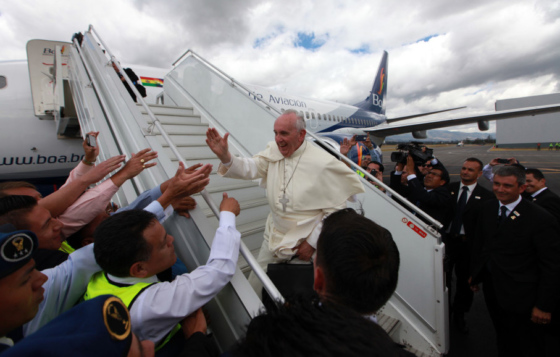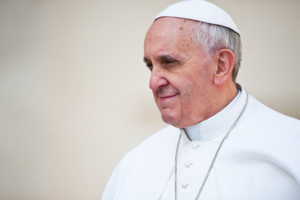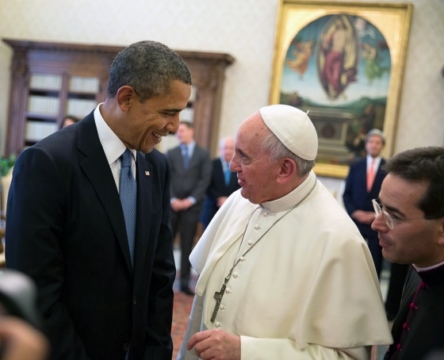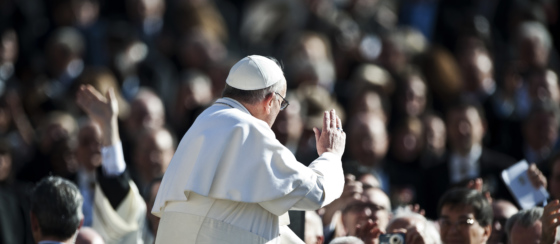
Nicolás & Jorge Mario: The Pope’s Venezuela Test
Venezuela remains a country where the Pope can and should use his influence to help bring about change.
While Francis is known as the Pope of the Periphery, Cuba has been anything but peripheral to the Vatican over the past two decades. The Argentine pontiff’s upcoming trip to the Caribbean nation will be the third papal visit in just seventeen years. Along with the Catholic giants of Brazil and Mexico, Cuba has been one of the focal points of Vatican attention in Latin America. In fact, many in Mexico, home to the world’s second largest Catholic population and a deadly drug war, are surprised that the Latin American pope is bypassing them for a much smaller country with the region’s smallest Catholic population. So why does the Vatican pay so much attention to Latin America’s least Catholic nation? According to a recent Univision-sponsored survey conducted on the island only 27% of Cubans are Catholic, and most of them are cultural Christians who don’t attend mass or participate in ecclesial activities on a regular basis.
Pope Francis is the chief architect of the momentous renewal of diplomatic relations between Cuba and the US. In part, his visits to both Cuba and the US are victory laps in celebration of a great diplomatic triumph, which seemed unimaginable before his papacy.
Dating back to Pope John Paul II’s historic trip in 1998, papal visits to the island nation have been eminently political. A Cold Warrior who fought communism both in his native Poland and on the international stage, the Polish pontiff sought to ease the restrictions on the Cuban Church imposed by the atheistic, communist regime. Seventeen years later, John Paul II’s lobbying for freedom of worship has paid dividends in terms of greater liberty to practice one’s faith, especially Catholicism, which while relatively small still outnumbers its two main rivals – Protestantism and Santeria (the main Afro-Cuban religion).

And though it takes place in a different historical context than the previous two papal trips, Pope Francis’s upcoming visit is certainly politically motivated. He is the chief architect of the momentous renewal of diplomatic relations between Cuba and the US. The diplomat pope took the initiative last year with both President Obama and his Cuban counterpart Raul Castro and then hosted bilateral negotiations at the Vatican. In part, his visits to both Cuba and the US are victory laps in celebration of a great diplomatic triumph, which seemed unimaginable before his papacy.
But the political nature of his visit to the only full-fledged socialist regime in the Americas goes further. While restrictions on the Church have eased significantly since 1998, they are still onerous and seriously curtail the autonomy of all religious denominations but especially Catholicism and the scores of Evangelical Protestant churches that are flourishing on the island, as in the rest of Latin America. In continuity with the previous Vatican strategy of constructive engagement with the Castro regime, Pope Francis will probably make mild public pronouncements in favor of both religious and political liberty with more frank talk to Raul Castro behind closed doors.
And the Cuban head of state is so impressed with the Argentine Francis that he recently said he might consider returning to the Catholic fold. Like so many Latin American elite, the Castro brothers received a Jesuit education, which makes them even fonder of the first Jesuit pope. Beyond words, the Castro regime expressed its appreciation for Francis by releasing the greatest number of prisoners, 3,522, since 1959. The Jesuit pope, of course, has made a point of visiting prisioners on most of his trips abroad. Criticism of the global capitalist system also unites the Pope of the Periphery with the Castro regime. However, precisely because of this commonality I think we can expect the Argentine pope to mute his criticism of global capitalism in order to distance himself from the authoritarian regime.
As much as he seems to relish his role as international diplomat, Pope Francis is the CEO of the Catholic Church and, as such, job one is the profitability of the enterprise. In fact, profitability or membership growth is so paramount that it’s the main reason a Latin American cardinal was elected pope.
Yet, as much as he seems to relish his role as international diplomat, particularly when it concerns his native Latin America, Pope Francis is the CEO of the Catholic Church and, as such, job one is the profitability of the enterprise. In fact, profitability or membership growth is so paramount that it’s the main reason a Latin American cardinal was elected pope. Home to 40% of the world’s Catholic population, Latin America has been hemorrhaging Catholics, mostly to Pentecostalism, since the 1970s. Beyond Cuba, most of Central America is no longer majority Catholic, and Brazil, with the world’s largest Catholic population is now just 61%, and will likely no longer be a Catholic-majority nation by 2030, if not sooner.
Thus in the context of precipitous Catholic decline in Latin America, the Cuban case is of the utmost urgency. While the Catholic Church is the most respected institution on the island, according to the Univision-sponsored survey, respect isn’t the same as enthusiasm. Enthusiasm for both Santeria and Pentecostalism, the leading type of Protestantism on the island and all of Latin America, is greater than for Catholicism, which historically has never been very dynamic throughout the Caribbean. Cognizant of this, the charismatic pope, who is immensely popular among Cubans, seeks to generate the type of excitement felt during his Brazilian and South American trips, especially among Cuban young people. No doubt, large crowds will turn out across the island to see the first Latin America pope, but will the excitement of the moment translate into more parishioners in the pews?
Andrew Chesnut is the Bishop Walter F. Sullivan chair in catholic studies and a professor of religious studies at Virginia Commonwealth University. A specialist in Latin American religious history, he is the author of Born Again in Brazil: The Pentecostal Boom and the Pathogens of Poverty (Rutgers UP, 1997), Competitive Spirits: Latin America’s New Religious Economy (Oxford UP, 2003), and Devoted to Death: Santa Muerte, the Skeleton Saint (Oxford UP, 2012). Chesnut is a featured blogger for the Huffington Post. Follow him on Twitter @AndrewChesnut1.
Andrew Chesnut on Latin Pulse (Sep 11 2015)
Venezuela remains a country where the Pope can and should use his influence to help bring about change.
As he has to date, Pope Francis will remain pragmatic and realistic in pursuing his principles and goals in both the US and Cuba.
The Pope’s five-day trip across Mexico is on a route deliberately made to draw attention to the dangerous journey taken by migrants to the US.

